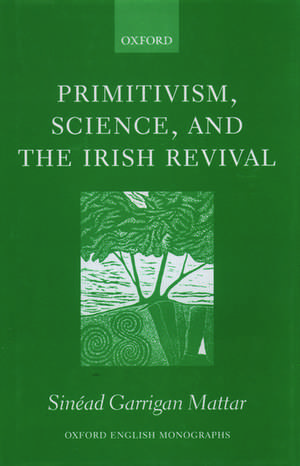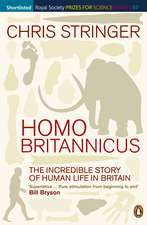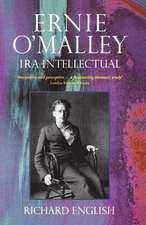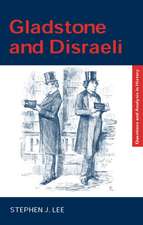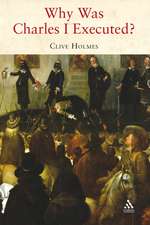Primitivism, Science, and the Irish Revival: Oxford English Monographs
Autor Sinéad Garrigan Mattaren Limba Engleză Hardback – 26 feb 2004
Din seria Oxford English Monographs
- 12%
 Preț: 492.54 lei
Preț: 492.54 lei - 28%
 Preț: 472.45 lei
Preț: 472.45 lei - 28%
 Preț: 487.35 lei
Preț: 487.35 lei - 23%
 Preț: 473.01 lei
Preț: 473.01 lei - 24%
 Preț: 498.33 lei
Preț: 498.33 lei - 21%
 Preț: 528.16 lei
Preț: 528.16 lei - 28%
 Preț: 497.29 lei
Preț: 497.29 lei - 28%
 Preț: 406.14 lei
Preț: 406.14 lei - 16%
 Preț: 473.94 lei
Preț: 473.94 lei - 28%
 Preț: 473.47 lei
Preț: 473.47 lei - 26%
 Preț: 527.79 lei
Preț: 527.79 lei - 22%
 Preț: 497.63 lei
Preț: 497.63 lei - 30%
 Preț: 516.27 lei
Preț: 516.27 lei - 28%
 Preț: 437.84 lei
Preț: 437.84 lei - 26%
 Preț: 515.71 lei
Preț: 515.71 lei - 28%
 Preț: 498.06 lei
Preț: 498.06 lei - 12%
 Preț: 494.84 lei
Preț: 494.84 lei - 27%
 Preț: 407.74 lei
Preț: 407.74 lei - 28%
 Preț: 472.09 lei
Preț: 472.09 lei - 16%
 Preț: 472.24 lei
Preț: 472.24 lei - 28%
 Preț: 473.16 lei
Preț: 473.16 lei - 25%
 Preț: 490.28 lei
Preț: 490.28 lei - 25%
 Preț: 521.94 lei
Preț: 521.94 lei - 30%
 Preț: 505.56 lei
Preț: 505.56 lei - 30%
 Preț: 673.12 lei
Preț: 673.12 lei - 34%
 Preț: 773.65 lei
Preț: 773.65 lei - 23%
 Preț: 329.18 lei
Preț: 329.18 lei - 34%
 Preț: 800.49 lei
Preț: 800.49 lei - 34%
 Preț: 1078.49 lei
Preț: 1078.49 lei - 34%
 Preț: 1034.87 lei
Preț: 1034.87 lei - 34%
 Preț: 1167.40 lei
Preț: 1167.40 lei - 34%
 Preț: 1019.76 lei
Preț: 1019.76 lei - 31%
 Preț: 351.12 lei
Preț: 351.12 lei - 20%
 Preț: 230.13 lei
Preț: 230.13 lei - 34%
 Preț: 979.50 lei
Preț: 979.50 lei - 34%
 Preț: 1181.23 lei
Preț: 1181.23 lei - 34%
 Preț: 1035.56 lei
Preț: 1035.56 lei - 20%
 Preț: 272.11 lei
Preț: 272.11 lei - 34%
 Preț: 1035.28 lei
Preț: 1035.28 lei - 34%
 Preț: 1080.62 lei
Preț: 1080.62 lei - 46%
 Preț: 466.34 lei
Preț: 466.34 lei - 34%
 Preț: 991.10 lei
Preț: 991.10 lei - 34%
 Preț: 874.40 lei
Preț: 874.40 lei - 31%
 Preț: 698.29 lei
Preț: 698.29 lei - 34%
 Preț: 859.88 lei
Preț: 859.88 lei - 34%
 Preț: 1108.02 lei
Preț: 1108.02 lei - 34%
 Preț: 859.05 lei
Preț: 859.05 lei - 34%
 Preț: 1006.88 lei
Preț: 1006.88 lei - 34%
 Preț: 1196.96 lei
Preț: 1196.96 lei - 31%
 Preț: 421.29 lei
Preț: 421.29 lei
Preț: 1196.48 lei
Preț vechi: 1822.34 lei
-34% Nou
Puncte Express: 1795
Preț estimativ în valută:
228.94€ • 238.57$ • 189.57£
228.94€ • 238.57$ • 189.57£
Carte tipărită la comandă
Livrare economică 24-29 martie
Preluare comenzi: 021 569.72.76
Specificații
ISBN-13: 9780199268955
ISBN-10: 0199268959
Pagini: 288
Dimensiuni: 146 x 224 x 20 mm
Greutate: 0.46 kg
Editura: OUP OXFORD
Colecția OUP Oxford
Seria Oxford English Monographs
Locul publicării:Oxford, United Kingdom
ISBN-10: 0199268959
Pagini: 288
Dimensiuni: 146 x 224 x 20 mm
Greutate: 0.46 kg
Editura: OUP OXFORD
Colecția OUP Oxford
Seria Oxford English Monographs
Locul publicării:Oxford, United Kingdom
Recenzii
This forceful and engaging book will oblige significant revision of established critical views of Yeats, Synge, and Gregory.
Mattar shows how Yeats, Synge and Gregory variously construed anthropologists' changing ideas of the "primitive"... One reason why Yeats and Synge got into trouble was because Irish nationalism retained self-boosting and Christianized "noble savage" concepts, whereas they had absorbed comparative anthropology's tilt towards darker gods. This more interesting, problematic and disturbing brand of primitivism, Mattar suggests, underlies the ritualistic forms they introduced to the Irish theatre - whether to awaken the audience or the gods. Mattar's book exemplifies the value of questioning both the Revival's self-projections and powerful academic paradigms.
Mattar shows how Yeats, Synge and Gregory variously construed anthropologists' changing ideas of the "primitive"... One reason why Yeats and Synge got into trouble was because Irish nationalism retained self-boosting and Christianized "noble savage" concepts, whereas they had absorbed comparative anthropology's tilt towards darker gods. This more interesting, problematic and disturbing brand of primitivism, Mattar suggests, underlies the ritualistic forms they introduced to the Irish theatre - whether to awaken the audience or the gods. Mattar's book exemplifies the value of questioning both the Revival's self-projections and powerful academic paradigms.
